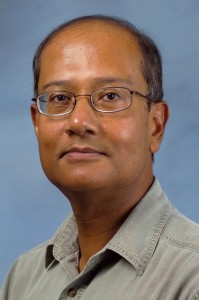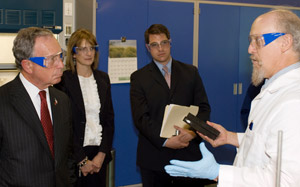Like most industries throughout the world, the resort industry is seeing a growing trend in the use of renewable energy and “green” practices. More and more hotels in tourist destinations across the globe are trying to be good stewards to their visitors, as well as to the environment, by utilizing renewable energy applications for powering their facilities, rather than passing off the current high energy costs to customers through higher rates. Seeing the industry take such positive strides is what inspired researchers at the Florida Solar Energy Center (FSEC) to develop a program to promote eco-tourism in the Caribbean, one of the most popular tourist destinations, and around the world.
Author: Sherri Shields
Climate Change Conference Promotes Florida’s “Green” Leadership
The second annual Serve to Preserve Summit on Global Climate Change, hosted by Florida Governor Charlie Crist on June 25-26, 2008, continued to promote Florida’s excellence as a growing leader in alternative fuels and conserving the state’s natural environment. The summit also focused on the need to pursue alternative fuels and renewable energy as a means for economic benefits through a variety of “green” technologies.
NYC Mayor Bloomberg Visits FSEC
The Florida Solar Energy Center (FSEC) welcomed the Mayor of the City of New York, Michael Bloomberg, and First Deputy Mayor Patricia Harris for a tour of the facility on Friday, June 20, 2008. Mayor Bloomberg expressed an interest in learning about FSEC’s role in the research and development of large-scale photovoltaic (PV) systems and hydrogen fuel cells, as well as recent breakthroughs related to “green”, energy-efficient building practices.
Subrato Chandra Recognized by DOE Assistant Secretary Karsner

As project manager for the Building America Industrialized Housing Partnership (BAIHP), FSEC’s Subrato Chandra was recognized earlier this year by U.S. Department of Energy (DOE) Assistant Secretary, Alexander Karsner, for his outstanding support during the development of the DOE Builders Challenge.
In February, the Builders Challenge called on the U.S. homebuilding industry to build at least 220,000 high-performance, energy-efficient homes by 2012. The initiative was announced at the 2008 International Builder’s Show (IBS) in Orlando, Fla., where Chandra and other FSEC researchers provided live technical assistance at the DOE booth. Out of the 40 pioneering builders that signed up for the challenge prior to its launch at the IBS, Chandra and the BAIHP team were responsible for recruiting 18 of these builders.
“Your enthusiasm and dedication are exceptional,” wrote Assistant Secretary Karsner in a letter to Chandra. “It is because of the hard work and dedication by individuals like you that America is able to meet the challenges of energy security and climate change head on at this critical time in our history.”
The Building America Industrialized Housing Partnership (BAIHP) team is the only university-based Building America team competitively funded by the U.S. Department of Energy, Office of Energy Efficiency and Renewable Energy-Building Technologies program. BAIHP works with partners throughout the United States. The project focuses on effectively balancing cost, design, construction, and energy decisions to develop customized solutions for our team members. The BAIHP brings practical research expertise to America’s Home Building Industry.
NYC Mayor Bloomberg Visits FSEC
NYC Mayor Bloomberg Visits FSEC
The Florida Solar Energy Center (FSEC) welcomed the Mayor of the City of New York, Michael Bloomberg, and First Deputy Mayor Patricia Harris for a tour of the facility on Friday, June 20, 2008. Mayor Bloomberg expressed an interest in learning about FSEC’s role in the research and development of large-scale photovoltaic (PV) systems and hydrogen fuel cells, as well as recent breakthroughs related to “green,” energy-efficient building practices.
The mayors’ tour took them through some of FSEC’s laboratories, including the Manufactured Housing Lab, FSEC’s 1,600 square-foot manufactured home that serves as a training center and building science laboratory. They also stopped at the PV testing lab and the thin film PV lab, where researchers are developing the next generation of high-efficiency PV cells, as well as the hydrogen and fuel cell lab.
|
As the mayors walked through the PV testing areas, they learned about FSEC’s testing techniques and requirements. A PV roof-top system, used during FSEC’s PV installer courses, was used to demonstrate how a properly installed PV system operates and show how students in the installer course verify a system has been installed correctly. In the thin film PV lab, researchers spoke with the mayors about the different types of PV cells and the work being performed at FSEC to increase the efficiency of thin film PV cells while lowering their price. In the hydrogen labs, researchers explained the physics behind hydrogen fuel cells and demonstrated FSEC’s patented hydrogen-detection sensor, Smart Paint.
Mayor Bloomberg is the 108th Mayor of the City of New York. Elected to office only two months after the 9/11 attacks in 2001, he helped the city to rebound faster and stronger than anyone expected. He has recently undertaken a campaign to fight global warming while preparing New York for an estimated million more residents by 2030, through the efficient use of land, water and energy.
